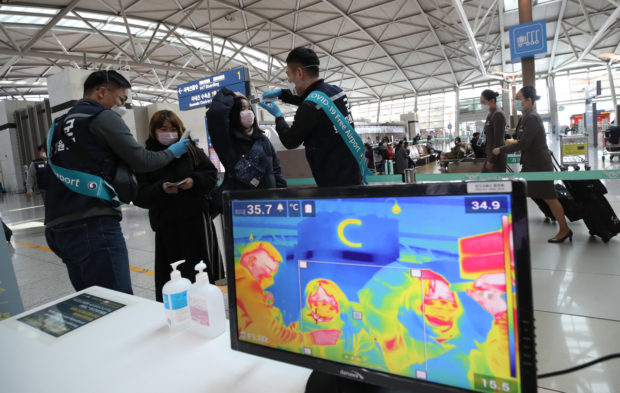SEOUL — South Korea’s aviation industry is likely to see losses from the coronavirus outbreak snowball to at least 5 trillion won ($4.2 billion) by June, according to industry sources on Sunday.
With more international routes shutting down as countries announce entry bans on people traveling from Korea, at least 5.8 trillion won of losses are expected from the country’s eight air carriers, based on the calculation from their flight records as of the fourth week of February.
But such losses are likely to grow further considering that more air carriers will halt services to Japan following Tokyo’s restriction of travel from South Korea over virus.
According to Korea Civil Aviation Association, the number of passengers on international routes in the fourth week of February came at 652,626, a 65.8 percent drop on-year.
Passengers on flights to China dropped by 85.2 percent, while those on Japanese routes and Southeast Asian routes fell by 70.6 percent and 62.1 percent, respectively.
Industry experts said the air carriers’ snowballing losses mostly come from fixed monthly costs of at least 10 billion won for aircraft leases, airport charges, office rents, not including the labor cost for employees.
Air carriers Korean Air said they have paid more for refunds than ticket sales in February, with an almost 30-fold jump in requests for refunds.
In February alone, Korean Air saw a 37.6 percent fall in passenger numbers on international routes at 610,000, while their boarding rate hovering at 60 percent. The number of flights also reduced from 624 flights to 409, during the fourth week of February.
Following Japan’s entry restriction on South Koreans effective from Monday, South Korean air carriers are likely to see more losses coming from suspension of the service to the country’s one of the most visited destination.
South Korean full-service carrier Asiana Airlines said it has decided to suspend all Japanese routes, the first in 30 years since the route was launched in 1990.
Korean Air said it will halt 16 of 17 Japanese routes from Monday to March 28.
With local budget carriers like T’Way joining the complete shutdown of Japanese routes, Korean Air’s Incheon-Narita, Jeju Air’s Incheon-Narita and Incheon-Osaka routes will be the only flights to Japan in operation from Monday.
As the country’s aviation industry faces an unprecedented freefall, the government is also keen to arrange additional support measures.
On Feb. 17, the Ministry of Land, Infrastructure and Transport released a plan to support the ailing aviation industry with up to 300 billion won of loans and a delay of payment for airport charges for three months. It also held additional C-level talks to gather consensus.
But the air carriers have been demanding “more practical” support from the government.
On Wednesday, Korean Air sent a statement requesting Transport Minister Kim Hyun-mi to delay the planned withdrawal of the company’s international traffic rights, airspace passage rights and distributed slots — the number of flights that an air carrier can fly in an hour.
The air carrier reportedly cited a massive cost burden to meet the criteria to secure such rights and slots as the reason.
To retain traffic rights, an air carrier must use them 20 weeks annually, using at least 50 percent of its airspace passage rights.
But based on the country’s Aviation Business Act’s article 17, the Transport Minister can cancel the withdrawal of such rights in emergency situations including a war, a closure of the airport or over security issues.
The ministry said the additional support measures for air carriers will be released this week, regarding delay of withdrawal of traffic rights and slot, as well as tax deductions.
The ministry added that it was also closely in talks with the Ministry of Economy and Finance, Financial Services Commission and the state-run Korea Development Bank to offer liquidity to low cost carriers.


